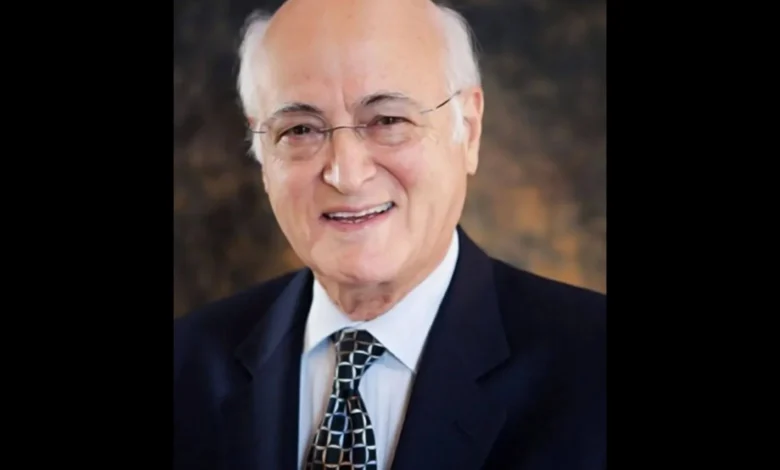The Untold Story of Abdulfattah Jandali The Man Behind a Technological Legacy

Abdulfattah Jandali is a name that may not resonate with the same global recognition as Steve Jobs, but his story is interwoven with one of the most significant narratives in the modern technological era. Known primarily as the biological father of the late co-founder of Apple Inc., Steve Jobs, Abdulfattah Jandali has led a life full of intellectual pursuit, personal complexities, and quiet dignity.
While the world often idolizes innovation and entrepreneurship through names like Jobs, Gates, or Musk, few pause to look deeper into the lives of the individuals who indirectly shaped these personalities. Abdulfattah Jandali, through his heritage, choices, and circumstances, contributed to a legacy that changed the world — even if from a distance.
Early Life and Education
Abdulfattah Jandali was born in 1931 in Homs, Syria, into a prominent Muslim family. His father was a self-made millionaire, a landowner with deep cultural roots and a vision for the future of his family. Growing up in a well-educated environment, Abdulfattah Jandali was instilled with the values of academic excellence and societal responsibility from an early age.
Driven by the pursuit of higher education, Abdulfattah Jandali left Syria in the 1950s to study in the United States. He enrolled at the University of Wisconsin, where he pursued a degree in political science and economics. This decision marked a turning point not only in his life but eventually in the course of technological history.
A Brief Encounter with History
While studying in Wisconsin, Abdulfattah Jandali met Joanne Schieble, a young American woman from a strict Catholic family. The two developed a relationship, but due to cultural and religious differences, their romance was fraught with difficulties. In 1955, Joanne gave birth to a baby boy in San Francisco, whom she and Jandali named Steven. However, due to family pressures and societal norms of the time, the child was put up for adoption.
Steve Jobs was adopted by Paul and Clara Jobs, a working-class couple from California. They raised him with love and support, completely detached from the background of Abdulfattah Jandali. Jobs would later become one of the most influential entrepreneurs in modern history, co-founding Apple and revolutionizing multiple industries including computing, animation, and telecommunications.
Life After the Separation
After the separation from Joanne Schieble and the adoption of their son, Abdulfattah Jandali continued his academic journey, earning a Ph.D. in economics and political science. His career path led him into academia and later into the hospitality business. He managed several restaurants and hotels over the years, especially in Nevada.
Despite his personal and professional achievements, Abdulfattah Jandali lived most of his life away from the public eye. He did not actively seek a relationship with Steve Jobs, especially after learning about their biological connection much later in life. By the time he realized the identity of his son, Jobs had already become a global figure.
The Complex Father-Son Dynamic
The relationship between Abdulfattah Jandali and Steve Jobs has long intrigued both fans and biographers. Jobs was aware of his biological father’s existence but showed little interest in reconnecting. In interviews, he mentioned that he had no desire to meet Jandali, describing the man as someone who “ran a restaurant.”
For Abdulfattah Jandali, the estrangement was a source of quiet sorrow. In rare public statements, he expressed regret about the lost opportunity to be part of his son’s life. He acknowledged that he had unknowingly met Jobs once at a restaurant he managed, but at the time, neither of them knew of their biological connection.
This deeply emotional and complicated story reflects the often unpredictable outcomes of human relationships. For Abdulfattah Jandali, the weight of what could have been is perhaps a personal burden he continues to carry.
A Man of Principles
Despite the drama surrounding his early life in America, Abdulfattah Jandali is described by those who know him as a principled and intelligent man. He has always maintained his dignity, avoiding media sensationalism, and choosing a life of quiet contribution. His love for academia, culture, and conversation makes him a figure worth appreciating beyond the limited context of being Steve Jobs’ biological father.
He also carried with him a deep respect for both his Arab roots and the opportunities that America provided him. His life stands as a bridge between two cultures, embodying the challenges and potentials of immigrant experiences.
Cultural Significance
In the Arab world, Abdulfattah Jandali’s story has attracted considerable interest, especially after Steve Jobs’ fame exploded globally. He has become something of a symbol — a reminder that behind global success stories often lie unsung figures from diverse backgrounds. For many young Arabs, the story of Abdulfattah Jandali serves as both an inspiration and a cautionary tale about the sacrifices made in pursuit of ambition and assimilation.
His life reflects the identity struggles that many first-generation immigrants face, torn between the traditions of their homeland and the values of their new countries. Yet, Abdulfattah Jandali navigated this duality with resilience, building a life based on merit, hard work, and quiet endurance.
Legacy Beyond DNA
Although Abdulfattah Jandali did not play a fatherly role in Steve Jobs’ life, his legacy extends beyond mere biology. Through education, perseverance, and intellectual pursuit, he contributed to the circumstances that allowed Steve Jobs to exist, thrive, and change the world.
Some might argue that destiny had other plans, and perhaps the separation allowed Jobs to grow up in an environment that uniquely shaped his personality and vision. However, it’s impossible to overlook the foundational role that Abdulfattah Jandali played — whether intentionally or not.
Modern Reflections
Today, Abdulfattah Jandali lives a quiet life, largely away from the limelight. As of the last known reports, he was still managing businesses and occasionally granting interviews reflecting on his past. He remains a deeply private individual, often declining to speak extensively about Steve Jobs or his own emotions regarding their estranged relationship.
Yet, in a world increasingly obsessed with celebrity and visibility, Abdulfattah Jandali’s story stands as a powerful reminder of the value of character, humility, and quiet strength. He may not have launched a tech empire, but his journey — from Homs to Wisconsin, from academia to business — is an extraordinary tale in its own right.
Conclusion
The name Abdulfattah Jandali may forever be linked with Steve Jobs, but his life story is far more expansive and nuanced than that single connection. He represents a generation of immigrants who carried dreams across oceans, navigated cultural and emotional challenges, and contributed to society in understated yet impactful ways.
In exploring the life of Abdulfattah Jandali, we uncover not just the origin of a tech visionary, but the resilience of a man who made difficult choices and lived with their consequences. His legacy may not be carved in silicon or software, but it is etched in the complex, beautiful web of human history.


